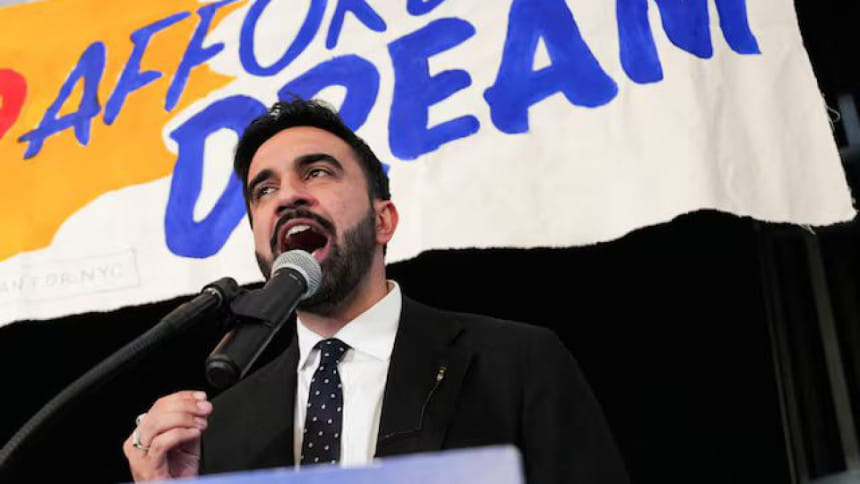How Mamdani toppled a titan and redefined American politics

In a political landscape engineered to favour dynasties, deep pockets, and establishment darlings, Zohran Mamdani's 2025 New York City Democratic mayoral primary victory was a seismic upset. The 33-year-old state assemblyman from Queens—a democratic socialist, practising Muslim, and vocal critic of Israel's policies—defeated Andrew Cuomo, a former governor with millions in donations and a once-dominant name. Mamdani's win wasn't just an upset; it was a masterclass in defying a system designed to sideline outsiders like him. Analysts called it the biggest electoral shock since David Dinkins' 1989 victory, a triumph of trust over cash, authenticity over clout. Without an Ivy League degree, political legacy, or billionaire backers, Mamdani's rise offers a blueprint for challenging the status quo.
Mamdani's path to victory began long before his mayoral run, rooted in relentless grassroots activism. As a foreclosure prevention counsellor in 2016, he helped Queens and Brooklyn families fight predatory landlords during the post-recession housing crisis. Elected to the New York State Assembly in 2020 for District 36, he championed the rent stabilisation system, protecting 2.5 million tenants, and co-sponsored the Good Cause Eviction law to shield renters from soaring costs. His 2022 push to cancel rent during Covid, backed by 10,000 petition signatures, made him a hero in places like Jackson Heights, where 60 percent of residents are rent-burdened.
Beyond housing, Mamdani helped secure $1.3 billion in relief for undocumented workers excluded from federal aid. His weekly "Office Hours" at bodegas (small grocery shops, especially in Spanish-speaking neighbourhoods) and subway stops, listening to cabbies and nurses, became legendary. His efforts, amplified on social media, built a loyal following of 500,000 across Instagram and TikTok by 2024. "Zohran was fighting for us when no one else was," a Bangladeshi organiser told The Juggernaut. This trust, forged through years of unglamorous work, made Mamdani a household name among NYC's working class, setting the stage for his 2025 upset.
Mamdani's path was fraught with obstacles. As a Muslim of Indian-Ugandan descent, his identity invited scrutiny. His support for Palestinian rights, calling Israel's actions in Gaza a "genocide" and endorsing the Boycott, Divestment, Sanctions (BDS) movement, drew accusations of antisemitism, which he refuted. His refusal to condemn "globalise the intifada," decried by some Jewish leaders as a call to violence, also fueled controversy, drawing rebukes from institutions like the US Holocaust Memorial Museum. Mamdani faced Islamophobic attacks, including from a pro-Cuomo mailer that darkened his skin and beard, which he condemned as "blatant Islamophobia" at a June 10 press conference. He proposed a $50 million fund for interfaith community centres, earning endorsements from progressive Jewish groups like "Jews for Racial & Economic Justice". On The Late Show with Stephen Colbert, he called out the smear as a "desperate tactic by a fading dynasty," earning applause and two million TikTok views. His stance on Palestinian rights, rooted in non-violence, resonated with young voters, progressive Jews, and Muslims.
Mamdani's critique of Indian Prime Minister Narendra Modi, labelling him a "war criminal" over the 2002 Gujarat riots, sparked backlash among some Indian Americans. Groups like Indian Americans for Cuomocalled him a "Hindu-hating bigot," and a New India Abroad op-ed urged Hindus to reject him. Mamdani countered with a Hindi campaign video featuring clips from the movie Deewaar to frame his fight as one for justice, not division. He attended interfaith events, like a May 20 Brooklyn rally with Sikh and Jain leaders, and secured an endorsement from Indian American Impact Fund, a political organisation and lobbying group,for his "inclusive vision." Sunita Viswanath of Hindus for Human Rights, an American non-profit, tweeted support, calling him a "unifier."
His democratic socialist label drew scepticism from moderates wary of his policies—free buses, rent freezes, city-owned grocery stores—which were deemed too radical for NYC's $115 billion budget. Critics, including Cuomo, attacked his lack of administrative experience, with the former governor warning that "inexperience is dangerous." The Democratic machine posed another hurdle: Cuomo entered with a $24 million war chest, backed by billionaires like Mike Bloomberg and airwaves flooded with anti-Mamdani ads. His endorsements included Bill Clinton and labour unions, leveraging his dynastic name and Covid-era nostalgia. Mamdani, with USD eight million from 20,000 small donors and 50,000 volunteers, started with just one percent name recognition, facing a system built to crush outsiders.
Mamdani turned barriers into strengths through authenticity and agility. He embraced his Muslim and South Asian heritage, releasing Urdu campaign videos and speaking to diverse communities. His refusal to back down on Palestine signalled fearlessness, resonating with voters tired of scripted politicians. A Bangladeshi Uber driver told one outlet, "Zohran is for peace, not war. He's for ordinary people."
Critics, including The New York Times, called his ideas "pie-in-the-sky." Yet, his focus on affordability connected with working-class New Yorkers. Rejecting corporate cash, he promised to "Trump-proof" the city, positioning himself as a genuine alternative to Cuomo's establishment playbook.
On June 24, 2025, Mamdani stunned the political world, defeating Andrew Cuomo by a strong margin in the final count, winning 56 percent to Cuomo's 44 percent. He won progressive strongholds like Brooklyn and flipped swing districts like Oakland Gardens. His coalition—young voters, Muslims, progressive Jews, and working-class communities—showed New Yorkers craved fresh leadership over Cuomo's "arrogant power grab." Cuomo's concession speech praised Mamdani's "smart and impactful campaign," admitting the old rules no longer applied.
Mamdani's win positions him as New York's potential first Muslim, South Asian, and millennial mayor, but the November 2025 general election against incumbent Eric Adams and possibly Cuomo as an independent will test his coalition. Governing a city with a $115 billion budget and 300,000 employees will be tougher, as seen in the struggles of progressive mayors like Chicago's Brandon Johnson. Yet, Mamdani's consultations with experienced municipal officials and pragmatic approach, inspired by Bernie Sanders' Burlington tenure, suggest he's preparing for the challenge.
Finally, Mamdani's victory signals that the Democratic Party's future may lie with those it once dismissed. In a city of eight million, where billionaires and dynasties once ruled, a young organiser with a bold vision proved the system isn't invincible. For aspiring politicians, his message is clear: authenticity, savviness, and a focus on the people can topple even the mightiest giants.
Hussain A Samad is a development researcher at the World Bank in Washington, DC.
Views expressed in this article are the author's own.
Follow The Daily Star Opinion on Facebook for the latest opinions, commentaries and analyses by experts and professionals. To contribute your article or letter to The Daily Star Opinion, see our guidelines for submission.

 For all latest news, follow The Daily Star's Google News channel.
For all latest news, follow The Daily Star's Google News channel. 






Comments